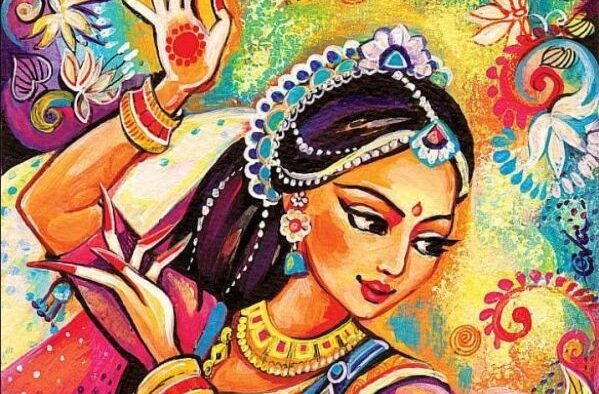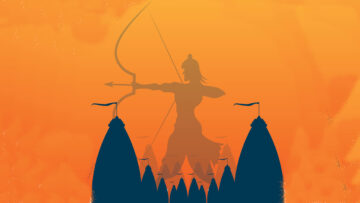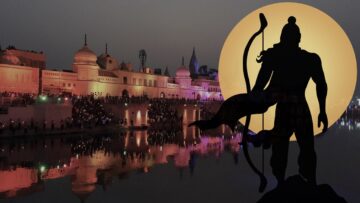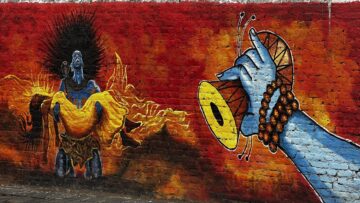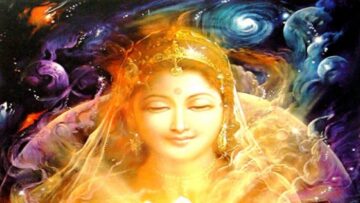Apsaras have been tributaries of the ever flowing Vedic scriptures. Some excelled in performing the most complicated tasks of alluring righteous humans while some got attracted towards the humans. The weave of the supernatural and the natural kept them interwoven in the threads of Puranic literature. Each of these celestial Apsaras is praiseworthy and empowered; at the same time modest and significant in the weave of Puranic scriptures.
Of the many Puranic celestial maidens, Apsara Alambuṣā has an important role in Hindu scriptures for laying the foundation of the Kingdom of Vishala and also in the birth of Kubera- the God of Wealth. She was also the mother of Ilabilā, who was born to her and King Tṛṇabindu. Her daughter Ilabilā was married to Viśravas, and gave birth to the God of Wealth – Kubera. Apsara Alambuṣā and King Tṛṇabindu also had three sons- Viśāla, Śūnyabandhu and Dhūmraketu. Prince Viśāla who founded the Viśāla Dynasty and Viśāli city .
तम् भेजेलम्बुषा देवी भजनीयगुणालयं वराप्सरायास्ते,
पुत्राः कन्या चेडबिडाभवत् तस्यामुत्पादयामास
विश्रवा धनदं सुतं प्रादाय विद्याम् परमामृषिर्योगेश्वरात्
पितुः विशालः शून्यबन्धुश्च धूम्रकेतुश्चतत्सुताः
विशालो वंशकृद्राजा वैशालीं निर्ममे पुरीम्
(tam bhejelambuṣā devī bhajanīyaguṇālayaṃ varāpsarāyāste,
putrāḥ kanyā ceḍabiḍābhavat tasyāmutpādayāmāsa
viśravā dhanadaṃ sutaṃ prādāya vidyām paramāmṛṣiryogeśvarāt
pituḥ viśālaḥ śūnyabandhuśca dhūmraketuścatatsutāḥ
viśālo vaṃśakṛdrājā vaiśālīṃ nirmame purīm)
(Bhāgavata, IX Skanda, Chap 2-31-33)
Meaning– He who is the seat of all creditable traits, King Tṛṇabindu was honoured by Alambuṣā as his consort . Iḍaviḍā their daughter was given in marriage to Visravas and to them was born Dhanada -Kubera. His father who was a great sage who taught him everything. Three sons Viśāla, Śunyabandhu and Dhūmraketu, were also born to them. Viśāla who was the founder of the Dynasty and built a city called Vaiśāli.
Apsara Alambuṣā and Vasu Vidhuma
Once, when Indra visited Brahmaloka to get an audience of Lord Brahma, He was accompanied by a Vasu called Vidhūma. While they were in the company of Brahma, Apsara Alambuṣā too came to greet Brahma. As she stood in the presence of Brahma, Devindra and Vasu Vidhūma; an unexpected gust of air pushed Apsara Alambuṣā’s dress she was wearing. Seeing Alambuṣā exposed by the thrust of the wind, Vasu Vidhūma was distracted. His attention moved away from Brahma and he desired the beautiful Apsara Alambuṣā. Alambuṣā sensed Vasu Vidhuma’s interest and acknowledged it through her glance. Brahma noticed the intense eye exchange between Apsara Alambuṣā and Vasu Vidhūma. He conveyed his displeasure to Indra. Indra in turn cursed both Apsara Alambuṣā and Vasu Vidhūma to to be born as humans. As a result of Deveindar’s curse, Vasu Vidhūmawas born as Sahasrānīka, a famous Chandravanshi King. Apsara Alambuṣā was born to King Kritavarma and his wife Kalavati, as Mṛgāvatī. As humans they both could marry each other and enjoy nuptial bliss.
Apsara Tilotammā curses King Sahasrānīka
Another story conveys that after Vasu Vidhūma was born as King Sahasrānīka he was invited by Dev Raj Indra to Devalok. Honouring Deveindra’s invitation, King Sahasrānīka stayed at Indralok as his guest. King Sahasrānīka was engaged in war with some Asuras and continued staying at Indralok for a while and after defeating some Asuras. When King Sahasrānīka got ready to leave Indrapuri, Dev Raj Indra sent Tilotammā with him to give him company in the long journey to Prithvi- Earth.
As Indra’s Charioteer, Mātalī navigated the chariot through the clouds, King Sahasrānīka maintained silence. He was deeply engrossed in the thoughts of beautiful Mṛgāvatī. He absolutely ignored the presence of Apsara Tilotammā who was accompanying him all through the journey. Feeling offended and neglected by King Sahasrānīka’s indifferent behavior, Apsara Tilotammā cursed him. She declared that he would remain separated from whatever or whomever he had been thinking of all the while when in her company. This separation would be for fourteen years. King Sahasrānīka was so deeply engrossed in the thoughts of Mṛgāvatī that Apsara Tilotammā’s curse went unheard by him.
King Sahasrānīka reached his capital, Kaushambi and thereafter married princess Mṛgāvatī. They were deeply in love with each other. Consequently Mṛgāvatī became pregnant and one fine day Mṛgāvatī expressed a desire to soak in a pool of blood. King Sahasrānīka built a pool of Lakshadi Rasa which looked similar to blood. While Mṛgāvatī was bathing in it, an eagle carried her away. King Sahasrānīka fell unconscious on viewing Mṛgāvatī being carried away by the eagle.
Indra’s charioteer Mātalī who had heard Apsara Tilotammā’s curse while descending from swarga. He descended from heaven to reveal Apsara Tilotammā’s curse. Mātalī helped to recover from the dreadful loss and shared with King Sahasrānīka, Apsara Tilotammā’s curse. King Sahasrānīka was troubled and angered with Apsara Tilotammā’s selfish act. He could do nothing about it so he decided to wait till the curse ended.
Meanwhile the eagle left Mṛgāvatī on top of the Udaya Mountain. The queen realized her hapless situation and cried aloud. Just then a large snake appeared and tried to gulp her down. Suddenly a Divine interference occurred that saved her from the snake and vanished. She was saddened by her plight and attempted to end her life. A young Rishi saw her and approached her. After understanding her situation, he consoled her and took her to the Rishi Jamadagni’s Ashram .
Liberation from Tilotammā’s curse
Rishi Jamadagni invited her to stay in the hermitage and informed that she would give birth to a brave boy. Mṛgāvatī stayed in the hermitage eagerly waiting the day she would be united with her husband. After a few months, she gave birth to a boy and named him Udayana. The boy grew up in the hermitage and learnt scriptures as well as weaponry from Rishi Jamadagni. Mṛgāvatī, still in separation from her husband, gave her son a bangle with Sahasrānīka’s name engraved on it.
Once, Udayana saw a snake charmer catching a snake. He asked the snake charmer to release it. The snake charmer denied to release the snake as it was his livelihood. Udayana gave him his bangle and got the snake released.
The snake after being released revealed to Udayana that he was Vasumeni, Vasuki’s elder brother. Vasumeni conveyed his obligation to Udayana for getting him released from captivity. Thereafter Vasumeni gifted Udayana with a veena. He also shared with him the mantras to obtain a garland that would never wither. He also helped him get a symbol on the forehead that would never fade.
Udayana returned to the hermitage after being blessed by Vasumeni and the snake charmer headed to the marketplace to sell the bangle with King Sahasrānīka’s name to make some money. The gold merchant saw King Sahasrānīka’s name engraved on the bangle and alerted the royal guards. The snake charmer was immediately taken to the palace. King Sahasrānīka asked the snake charmer how he had come to possess the bangle. The snake charmer narrated the entire story. Just as the King thought that the boy in the story was perhaps his son, a Divine tone confirmed it, and also declared that the curse had been lifted.
Accompanied with the snake charmer, King Sahasrānīka proceeded to meet his wife. They reached Rishi Jamadagni’s ashram and King Sahasrānīka was delighted to see his wife and son. The king asked Rishi Jamadagni’s permission to leave the hermitage along with his family and left. On reaching Kaushambi, King Sahasrānīka crowned Udayana as the king, and left with Queen Mṛgāvatī to meditate in the Himalayas.
The tale of Apsara Alambuṣā has all the ingredients of a magnificent adventure with curves, twists, sorrow and happiness. The story of Alambuṣā cautiously puts together a curse, an escape, some bliss, a long separation and finally a happy ending. It is an echo of the fact that what is destined happens, no matter what. The reason may be a fault, annoyance, a curse or a bit of a blemish beyond belief. The consequences may be good or bad, but hope is the last thing ever lost.
(Image credit: Quora)
Disclaimer: The opinions expressed in this article belong to the author. Indic Today is neither responsible nor liable for the accuracy, completeness, suitability, or validity of any information in the article.

